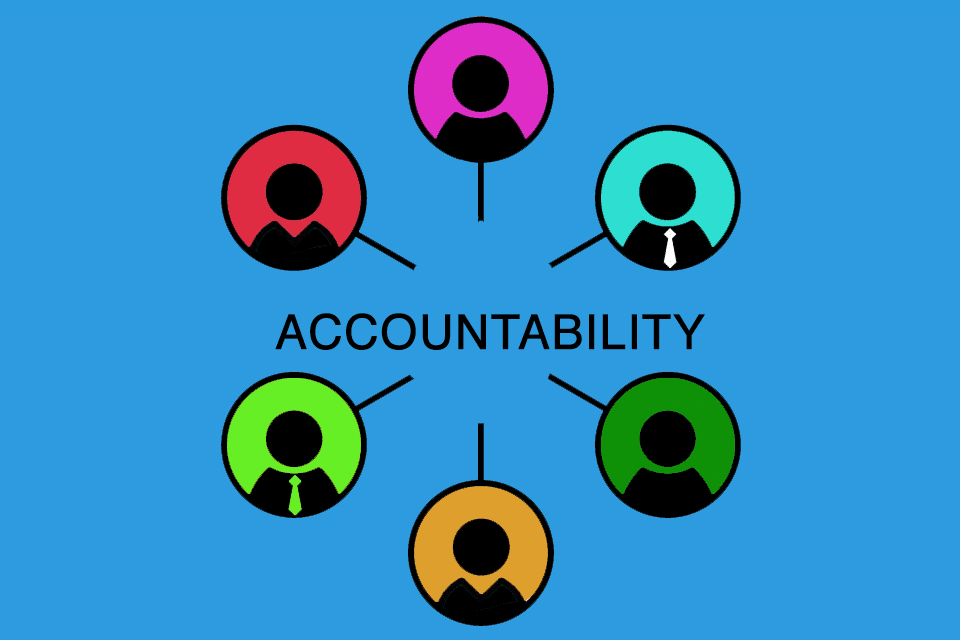What is Scrum Accountability?
Table of Contents: Definition – Meaning – Prerequisite – Acountability of the team – Differentiation between accountability and role – Critique – Download – Notes
Smartpedia: The Scrum Guide defines accountabilities instead of roles and thus emphasises the participants’ responsibility for results.
Scrum Accountability – acting responsibly
The Scrum Guide 2020 uses the term accountability instead of roles. Accountability is defined for
- Scrum Master,
- Product Owner and
- Developer.
The idea behind the term accountability is that every person who actively participates in a Scrum team takes responsibility.
But for what? For specific areas, the implementation of tasks, the adherence to commitments, the culture of cooperation or the results!
What does accountability mean?
The Cambridge Dictionary explains the term accountability as follows:
“the fact of being responsible for what you do and able to give a satisfactory reason for it, or the degree to which this happens”. [1]
So there is a conceptual overlap between accountability and responsibility.
And what does the Scrum Guide 2020 say?
“The Scrum Team is responsible for all product-related activities from stakeholder collaboration, verification, maintenance, operation, experimentation, research and development, and anything else that might be required….
The entire Scrum Team is accountable for creating a valuable, useful Increment every Sprint”.
From these two sentences it follows that the Scrum Team – i.e. Scrum Master, Product Owner and Developers – is both responsible for the implementation and the results. And this means that accountability means more than just a “general”, rather unspecific responsibility, but explicitly stands for a responsibility for results.
The prerequisite for accountability
There are a number of innovations in the Scrum Guide 2020, including an emphasis on commitments to artefacts and self-management rather than self-organisation. Self-management goes beyond self-organisation. In order for a Scrum team to take responsibility – for all product-related activities as well as for the results – it is important to be empowered accordingly. Simply put: the team must not only organise its own work independently, it must also be allowed to, should and must decide who does what, when and how within the team. Without this empowerment, responsibility for results is just organisational theatre.
Accountability of the team and participants
“The entire Scrum Team is accountable for creating a valuable, useful increment in each Sprint.” What does this mean in detail for the developers, the product owner and the Scrum master?
The developers are accountable for
- the creation of the sprint backlog,
- the adherence to the agreed Definition of Done,
- the daily adaptation of the plan to achieve the sprint goal and
- holding each other accountable as professionals.
The product owner is accountable for
- maximising the value of the product being developed and
- effective product backlog management including the development and communication of the product goal, the creation and communication of the backlog items with the determination of the order.
In addition, he or she must ensure that the product backlog is transparent, visible and understandable.
The Scrum Master is accountable for
- the effectiveness of the Scrum team.
To achieve this, he or she addresses activities towards the developers and the product owner as well as towards the organisation. In detail he/she
- supports the developers in self-management, interdisciplinary cooperation and in focusing on the increment to be created; if necessary, he/she helps to eliminate impediments and ensures the productive, positive execution of Scrum Events including adherence to the timebox.
- supports the product owner with techniques for defining the product goal and for backlog management, in empirical product planning and, if necessary, in cooperation with stakeholders.
- helps the organisation e.g. with the planning and implementation, training and coaching of Scrum, conveys the attitude and the empirical approach of Scrum, ensures a better understanding of Scrum and between the participants including the stakeholders.
Differentiation between accountability and role in Scrum
Why does the Scrum Guide emphasise accountability and do without the term role? [2] The idea behind this is that the terms are not about job descriptions, but about a minimum of responsibilities that are necessary for the execution of Scrum. The familiar roles of Scrum Master, Product Owner and Developers will continue to exist in practice. It is conceivable that the job descriptions will be much more extensive than the responsibilities that result from the Scrum Guide.
By not using roles as a term, Scrum chooses a different approach than other frameworks or process models. The V-Modell XT, for example, defines different roles for the creation of products. Employees with concrete roles participate per activity in the creation of products or results or are responsible for the creation. Apart from the fact that a distinction is made between project roles and organisational roles, there is a specific role description for each role, which comprises a maximum of five points:
- duties and authorities,
- skills profile,
- role occupation,
- responsibility and
- involvement.
Theoretically, it is of course conceivable that future job descriptions of defined Scrum roles will be designed accordingly. However, since the Scrum Guide explicitly proclaims Lean Thinking as reducing waste and focusing on the essentials, it is unlikely that the use of accountability instead of role will have much effect in practice.
A quiet critique of accountability
Self-management, commitment, accountability – these terms are becoming increasingly important in many organisations. And of course that is a good thing. Nevertheless, there is also criticism of accountability, which is emphasised in the Scrum Guide:
- On closer inspection, tasks rather than accountabilities are described for the “roles”. Example: “The developers are responsible for creating the sprint backlog”.
- Self-evident things are emphasised. Example: “The developers are responsible for adhering to the Definition of Done”; a) who else? and b) the Definition of Done is set by the developers with a purpose, which of course also has to be achieved.
- Statements on required skills to take responsibility for results are missing, and possible consequences are not mentioned.
Of course it is understandable that no consequences are mentioned, because on the one hand these would be context-specific, on the other hand Scrum is based on an attitude with defined values. The commitment of the team to achieve the agreed sprint goal, the commitment to quality, learning and doing the best together, for example, is essential for cooperation and the development of an agile culture. If skills are missing, it is important to develop them. One consequence would be, for example, to learn in the team to no longer place responsibility with others, but to take responsibility for one’s own actions, activities, commitments. This is an exciting process in many organisations and also an essential reason why accountability as a term implies much more than the naming of roles.
Impulse to discuss:
Does the new Scrum Guide and the emphasis on accountability change anything in practice? And if so, what?
Notes:
[1] Explanation of the Cambridge Dictionary
[2] Interestingly, the Scrum Expansion Pack, published in June 2025, refers to roles again (and introduces three additional roles: stakeholder, supporter and AI).
Do you already know the “Scrum Accountability Game”? You can find it here at Scrum.org.
If you like the article or would like to discuss it, please feel free to share it in your network. And if you have any comments, please do not hesitate to send us a message.
Here you will find additional information from our t2informatik Blog:




